- Home
- Courtney Milan
Seductive Starts Page 6
Seductive Starts Read online
Page 6
Safe, her dastardly senses whispered. He’s safe. There was something comforting about his forthright recital—comfort with an edge that only sharpened when he took a step closer to her.
“If I were a cobbler,” he said, “I’d offer you a discount on shoes.”
“Now you’ve completely lost your mind.”
“No. It would give me an excuse to measure your feet with my bare hands.” His lip twitched up. “And don’t think I’d stop at your toes.”
She had both her hands on top of his walking stick. She felt herself lean toward him, ever so slightly.
“But you’re not,” she said. “You’re the Wolf of Clermont, and I’m the woman you cannot drive away.”
“Can’t is such an unforgiving word,” he said. “I prefer do not wish to.”
This was a man who had walked away from his family at fourteen. He had a reputation for getting what he wanted.
But there was so much more to him than the boorish drone she’d once envisioned. He had talked about crushing her hopes and dreams, but when he stood next to her, he drove away the despair she’d carried for so long.
She wanted to steal him away—not to deprive Clermont of his use, but to have him for herself.
“Don’t tell me I can’t,” he was saying. “It implies an incapacity.”
“Can’t,” Serena repeated with a smile. “Can’t can’t can’t.”
“Ah, now you’re just taunting me.” He reached out and touched the side of the walking stick. “It’s a good thing this is between us, because otherwise I might forget that I’m not a footman. Or a cobbler.” He took another step in, and he was so close now that he warmed the night air around her. It scalded her lungs.
She’d thought him safe. She was wrong; there was nothing safe about him. But he stood along the path to safety. If she could steal his loyalty for her own…
For a brief moment, a dark shadow passed over her at all that would entail.
She squelched it. Never mind how she was to accomplish it. There was no point looking down when climbing. She’d repeated the word can’t, but after months of can’t, she was just going to have to prove that she could.
She uncurled one of her hands from the walking stick and laid it against his cheek. His jaw was rough and stubbled under her touch.
His breath sucked in. “Not a good idea, Serena. I’m no simple grocer. I don’t intend to marry, and even if I did, it is my job to thwart you.”
But he didn’t move back. He didn’t move forward, either. He simply waited, his eyes dark in the night.
Serena let go of the walking stick; it balanced on end, momentarily, before crashing to the ground.
And then he did move, slowly, leaning those final inches toward her.
At first it was just his lips that brushed hers, warm and certain, a fleeting pressure, swiftly removed. Then he rested his hand on her hip, drawing her to him. His mouth brushed hers once more; his lips parted, nipped at hers, and then again. Her whole body warmed.
She mimicked his motion—parting her lips—only to have him take them between his own, nibbling at her. She could have lost herself in that back-and-forth—the warmth of his breath, the taste of his mouth on hers. Shockingly, overwhelmingly sweet.
She’d thought of a kiss as the passive pressing together of lips—not this exchange of caresses. She was coming to life beside him—parts she’d never paid much mind to hummed in desire. The back of her neck tingled as he drew her close. The bottoms of her feet prickled with anticipation, as he kissed her again.
He licked at her lips, and she opened her mouth in shock. And as she did, he swept his tongue inside.
That act should have disgusted her. It didn’t. It felt amazing. Wonderful. She opened herself up to him, and then, tentatively, reached out her own tongue. His hands slid up her body, up the curve of her buttocks to clasp her spine. One of them caressed her arm, her elbow. And then his fingers cupped her breast. Lightly, slowly, and then, when she didn’t move away—when she pressed against him—with greater firmness.
And even though she knew that touch was a dreadful liberty, it felt right to have him touch her there—a heated counterpoint to the play of their lips.
“Ah, Serena,” he murmured. “This is not a good idea.” But he didn’t stop.
His hand slid slowly down her torso to the curve of her belly. And there his fingers came to a halt.
Serena froze. She swiftly covered his hand with hers, and just as abruptly pulled away. Her heart raced.
“What is it?” he said. His voice was husky, but his eyes narrowed. The streetlamp stood behind him, coloring his dark hair with warm tones.
And then he frowned and reached out once more—tentatively this time, and feathered his hand across her stomach. One couldn’t see it, not with corsets and petticoats being what they were. But a man who was pressed up against a woman, his hand caressing her, might feel it.
“Miss Barton,” he said slowly. “You have neglected to tell me something. Two somethings.”
“No.” She was unable to meet his eyes.
“That was your first kiss, was it not?”
She couldn’t bring herself to nod. Instead, she looked away.
“You said he didn’t force you.”
Her mouth went dry.
He shook his head. “Setting that aside—and how I can set that aside, I do not know… In all our discussions, in all the barbs we traded, was it not once relevant for you to mention that you were pregnant?”
Chapter Six
HUGO WAITED FOR HER to deny the accusation.
She didn’t. Instead, she leaned over and picked up his walking stick. He wasn’t sure if she was simply holding it between them to signal that their truce was over, or if she intended to hit him with it and walk away.
She let out a long breath. “And here I thought you knew.”
“How would I know? Magic?”
“I told Clermont,” she tossed back. “I assumed that what he knew, you—”
“Whatever made you imagine that he would be forthright with me? He told me this was an employment dispute. He told me that he’d hired you to take care of his unborn child.”
She raised her chin. “Well,” she bit off. “The position is unpaid, and he wasn’t referring to his heir. But that much was true.” Her hand had crept back to cover her belly. “Why do you think I’m here now? Why do you think I’ve spent days standing in the park? It certainly wasn’t for my own benefit. I am not going to fail my child.”
“Yes, and that’s the other thing. What sort of promises did the duke make to get you in bed?”
She was looking off into the distance. Her nostrils flared, and then she turned to him. “He promised not to wake the household.” There was a hint of a catch in her voice.
“No.”
She’d given voice to his blackest suspicions and painted them blacker still. Yet she stood out against that darkness like a blinding beacon. He already flinched from the thought of hurting a woman. But everything in him rebelled at the thought of causing harm to a mother. And by the ferocity of her words—the tell-tale touch of her fingers to her abdomen—she was that.
“He had made a few comments during the day,” she continued starkly. “I tried to ignore him, although it’s hard to ignore a duke who is a guest of the household. He made me uneasy, though. And then he came to my room at night.” The bareness of her recital was almost worse than the words she was saying. “I told him no; he insisted. I threatened to scream, and he said that if I did, the whole household would wake and they would blame me anyway. I had just started the position. If I lost it under such circumstances, I might not have found another.”
He swallowed back anger. “Why did you tell me you weren’t forced?”
She shook her head in confusion. “I wasn’t forced. I didn’t fight him.”
Hugo looked over at her. She seemed to be in earnest about the last. He wasn’t so certain. What the duke had done was not punishable by law, even i
f she had dared to bring felony charges to the House of Lords. If she couldn’t prove that she’d fought back, they would never convict him.
It didn’t mean she wasn’t forced. Somehow, what had happened seemed even worse than physical violence—as if Clermont had taken not only his pleasure and her future, but had robbed her of the right to believe herself blameless.
“I didn’t scream,” she repeated. “You tell me that you admire me as a worthy opponent. But you don’t understand. The only reason I refuse to back down now is because I refuse to let my child drown in silence.”
“You should have told me.”
“What would it have changed?”
Everything. There was a counterpoint to his father’s vicious words. It was neither loud nor insistent, but sometimes when he closed his eyes, he could remember his mother singing.
“At least I wouldn’t have made you stand all day, four days running,” he shot back. “I’d have understood that when you asked for recognition, you were not speaking solely about revenge. Tell me, Miss Barton, and tell me plainly. What is it you want?”
“I want funds enough for the future.”
“You’re looking for perpetual support?”
“No. That farm I told you about—I want to grow lavender, make soaps, and take them to market.”
He inclined his head.
“I want my child to be able to overcome the circumstances of his birth. If he is to be a duke’s son, he should have some advantages. I want him to go to Eton. Or, if she’s a girl, to have a Season. Clermont is the father. He owes his child some sort of future, and I will not go away until it’s secured.”
Hugo exhaled and tried to imagine the duke taking responsibility. He tried to imagine the duchess understanding. No use; it would never happen.
He tried to imagine himself driving Serena away—but that was an even more futile prospect. He was trapped between an improbability and an unlikelihood.
He frowned. “I’ll need to look into a few things,” he said. “But we’ll talk tomorrow—let us say at eleven in the morning. And this time I mean it. No threats—not from either of us. This is a problem.”
He reached out and set his hand over hers on the walking stick. She raised her eyes to his, wide and luminous.
“I solve problems,” he said.
FREDDY HAD BEEN IN BED when Serena arrived last evening; she was still sleeping when Serena awoke, early in the morning.
Serena was just slipping into her shoes in the entry when a querulous note sounded behind her.
“Serena? Are you sneaking out already? Where were you so late last night?”
Serena’s heart skipped a beat. “Out,” she said.
“Out doing what?”
“Out being…out.”
There sounded the thump of feet hitting the floor, and then Freddy turned the corner. Her countenance was screwed into worried little lines.
“You arrived in someone’s company,” she said. “I watched you.”
And she’d thought Freddy asleep. Her sister had likely been too upset to speak. There was no use denying the accusation, though, so Serena simply picked up her cloak.
“A man. Haven’t men caused you enough trouble?”
“It wasn’t like that.”
“Don’t you know how men are? It is always like that with them. Is that how you got in trouble? Walking out with a man after dark?” Freddy grimaced. “You’ve never learned your lesson.”
“What lesson should I have learned?”
Freddy straightened and set her hands on her hips. “I scarcely said a word when you flaunted your problems before all of Mayfair. And now I’m being forced to vacate the home I hold dear. I am made homeless, and you are out at all hours of the night cavorting with men.”
“I wasn’t cavorting. It was the Wolf of Clermont, if you must know. I have to speak with him. And even if it wasn’t, what do you expect me to do? Hide for the rest of my life, because something bad happened to me?”
Freddy’s lips compressed.
“If you’re worried about where to stay, I’ve a few leads on rooms. I’ll have us a new place by nightfall. I was just headed out to—”
As she spoke, Freddy reached down and picked up a pair of slippers. “Us?” she said. “We won’t have anything.” And then she threw the slippers at Serena.
They were made of wool and therefore bounced ineffectually off Serena’s forehead. Still, she was aghast. Mild-mannered Freddy, tossing things at her?
“How dare you?” Freddy said. “How dare you bring me into this?”
“Freddy—it’s just a place to stay. We’ll find a new one, just as good.”
“You don’t understand!” Freddy looked about the entry. “You’ve never understood. I have only ever had one safe place—these rooms—and now you’ve taken them from me.”
Freddy reached down and picked up the tired valise that stood next to the table.
“Listen to yourself,” Serena said. “You want me to hide, just like you do—hurt once, never risking anything else again. You won’t be satisfied until you’ve brought me down to your level.”
Freddy’s eyes flashed. Her lips pressed together, and in that moment, Serena had the horrible, awful feeling of having said too much. Freddy hurled the valise at her. It traveled only a few feet, lacking the basic capabilities to sustain long flight, and landed in a discordant crumple of leather and buckles.
“Do you not understand what happened to you?” Freddy glared at her. “You suffered a fate worse than death, and still you—”
“I am alive,” Serena said. “My child is alive. I intend to carry on living. Can you say that much?”
At that, Freddy swiped her hand across the side-table, tipping it over. It fell with a resounding crash.
Serena stepped forward and bent awkwardly to right the furniture. Her sister let out a sniff. “Oh, don’t bother,” she said crossly. “I’ll clean it up. I always do clean up after your messes. You would do it wrong, anyway. Go and dally with an entire company of men. I don’t care.”
Chapter Seven
AT ELEVEN O’CLOCK precisely, Serena was met at her bench by a man she had never seen before. He looked precisely the sort of man she would have imagined as the Wolf of Clermont a month ago—tall and muscular, eyes set close together, neck disappearing into broad shoulders.
“Miss Barton?” he asked.
Serena stood, folding the list of housing advertisements that she’d been perusing.
“I’m to show you around the back.”
She followed. It was foolish to be nervous. She’d talked with Mr. Marshall before. But not since he’d kissed her. Not since he’d discovered she was pregnant with another man’s child, and he’d drawn back.
He led her around the street and into a mews in back. From there, they ducked into the servants’ entrance in one of the white stone houses. The door opened onto a cellar. This he passed through swiftly, taking her up several flights of a narrow stair, and from there, into a richly carpeted hall, paintings on the walls.
All around her, the surroundings echoed wealth and generations of power—everything that had aligned itself against her. This was what she’d been fighting against. Not just the Duke of Clermont, or Mr. Marshall, but an entire country’s worth of opinion. She was as nothing compared to this sort of power—nothing more than a single grain in an entire sack of wheat. Nobody cared whether kernels wished to be ground into flour. It didn’t matter if she spoke or stayed silent; she had no voice either way.
Well, it mattered to her.
The servant came to a stop in front of a door, and Serena drew in a breath.
Her escort rapped on the door, once.
“Come in,” a voice said.
The man beside her opened the door. He held it for her, expectantly, and she realized that he wasn’t going to be entering with her.
She stepped into the room. Big strides. Head high. Breathe, she reminded herself. She was in an office—or at least she assumed it
was an office. It could have been a library, with those books on the shelves. But there was paper everywhere—not only strewn about in loose stacks, but also set in cunning little shelves and tied up with different colors of cotton tape, all of which seemed to have some meaning. Blue there, yellow here, red spread out on the desk.
She couldn’t see Hugo—the high back of the black leather chair was turned to shield him.
“Well, Mr. Marshall,” she said, walking into the room with more bravery then she felt, “So this is where you crush hopes and shatter dreams.”
“Very droll.” He rose to his feet. Despite his words, there was no indication that he saw anything amusing at all. His mouth was set in one firm, sober line. And when he’d caught her attention, he gestured to the solitary wooden chair that stood across the desk from him. “Sit,” he commanded.
Serena smoothed her palms over her skirt and complied.
He sank into his chair. But he didn’t start the conversation. He simply steepled his fingers and looked at her silently. She wondered what he was seeing. The woman he’d kissed last night? A lady of easy virtue? Or someone else entirely?
He frowned and then pushed back in his chair. “Well,” he said. “We appear to have found ourselves in a bit of a difficulty.”
“You don’t seem to have done too badly for yourself.”
“I haven’t even—” He broke off and blew out a frustrated puff of air. “Never mind. Here is what we are going to offer you.”
“Who do you mean by we?”
Mr. Marshall ignored this. “We can’t provide what you ask for—no Eton, no Season. To give that much, the duke would have to exert himself for the child. His wife would discover it, and he has too much to lose.”
“Then I shall continue to sit outside his house. What do you suppose the gossip will run to once I begin to show?” She began to stand.
He slammed his hand against the table with a resounding thud. “Wait.”
“Don’t you screech at me,” Serena snapped. “Not you of all people.”

 Her Every Wish
Her Every Wish Midnight Scandals
Midnight Scandals After the Wedding
After the Wedding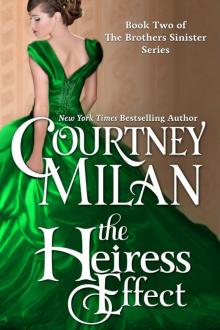 The Heiress Effect
The Heiress Effect Unraveled
Unraveled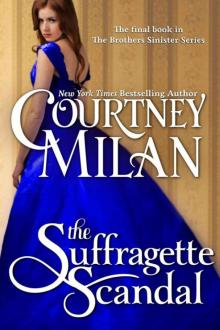 The Suffragette Scandal
The Suffragette Scandal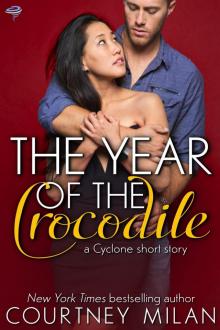 The Year of the Crocodile
The Year of the Crocodile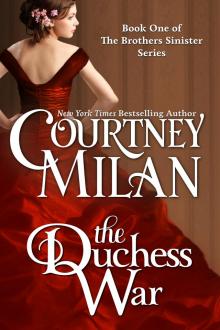 The Duchess War
The Duchess War What Happened at Midnight
What Happened at Midnight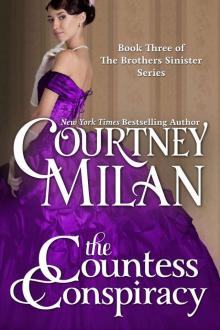 The Countess Conspiracy
The Countess Conspiracy Proof by Seduction
Proof by Seduction Unlocked
Unlocked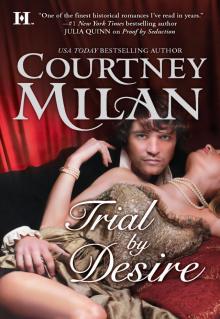 Trial by Desire
Trial by Desire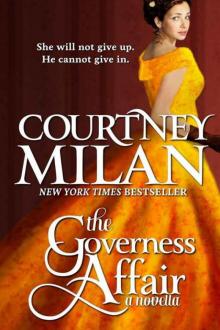 The Governess Affair
The Governess Affair Unveiled
Unveiled The Lady Always Wins
The Lady Always Wins Trade Me
Trade Me Unclaimed
Unclaimed This Wicked Gift
This Wicked Gift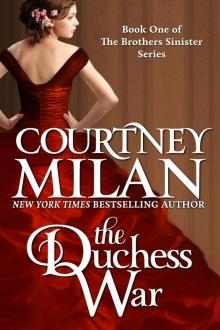 The Duchess War (The Brothers Sinister)
The Duchess War (The Brothers Sinister) Hamilton's Battalion: A Trio of Romances
Hamilton's Battalion: A Trio of Romances The Turner Series
The Turner Series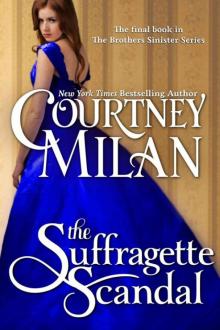 The Suffragette Scandal (The Brothers Sinister)
The Suffragette Scandal (The Brothers Sinister)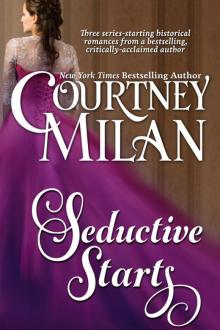 Seductive Starts
Seductive Starts The Pursuit Of…
The Pursuit Of… Hamilton's Battalion
Hamilton's Battalion The Carhart Series
The Carhart Series Seven Wicked Nights
Seven Wicked Nights This Wicked Gift (A Carhart Series Novella)
This Wicked Gift (A Carhart Series Novella)